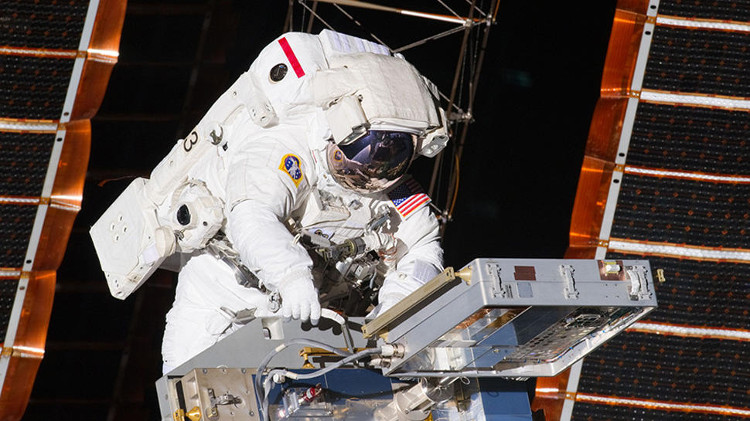NASA promotes commercialization of ISS International Space Station
In order to reduce the burden of operating costs, the US Aeronautics Agency (NASA) is promoting negotiations with global corporations to bid on daily activities at this space laboratory. in the coming years.
In an interview with the Washington Post on June 5, NASA Director Jim Bridenstine said he had worked with leaders of many large corporations interested in taking over the ISS operation within a coalition. However, Mr. Bridenstine did not specify which companies participated in the negotiations.
NASA is taking steps to prepare for the commercialization of ISS after the White House earlier this year announced that from 2025 it will stop providing direct federal funding for ISS.
The White House said NASA could continue to run some ISS activities, while handing over the space station's operation to private companies.

Drew Feustel astronaut made an extra-terrestrial walk on May 20, 2011.(Source: NASA / Zee News / VNA).
In order for the transition process to be smooth, the White House intends to require private companies to provide market analysis reports and development plans.
For its part, NASA said it would expand its list of commercial and international partners over the next seven years to maintain ISS operations to ensure people continue to reach and be present in Earth's orbit. low.
ISS privatization plan has met with fierce opposition by many US MPs because the US has contributed greatly to the total cost of ISS construction up to 100 billion USD.
Every year, the US spends 3-4 billion USD to maintain the operation of this space station.
Since the beginning of the 2001-2009 presidency of former President George W. Bush, NASA has contracted several activities to support ISS, starting with flights made by technology giants SpaceX and Orbital ATK.
The "inheritance" of private companies some logistical operations for ISS are more common during the tenure of the ISS. However, it is unclear how private commercial companies benefit from re-contracting the already degraded space research station.
ISS has a maximum living space of six people. Moving according to Earth's orbit 400km at a speed of about 28,000 km / h, ISS takes 90 minutes to complete a cycle around Earth.
Although launched in orbit in 1998, it was not until November 2, 2000, that ISS welcomed the first three astronauts of the First Expeditionary Team, including NASA's Bill Shepard, Russian astronaut. Yuri Gidzenko and Sergei Krikalev on a 136-day working trip.
Since 2011, American astronauts have not gone to ISS with domestically produced spacecraft that cost more than $ 70 million to get a ticket on the Russian Soyuz.
- NASA opened the International Space Station for ... tourists and film makers from 2020
- NASA wants to sell ISS space station in the next 10 years
- The uncertain future of the ISS space station when NASA returns to the Moon
- NASA celebrates 40 years of the first space station project
- ISS International Space Station is about to end its historic mission
- Visit 'the longest road' on the ISS International Space Station
- NASA gives ISS another 4 years of operation
- NASA lost contact with the international space station
- How big is the International Space Station (ISS)?
- How much does NASA pay for each ticket to space?
- NASA is about to launch 4K TV channel for free
- International space station increased altitude by 2km
 Van Allen's belt and evidence that the Apollo 11 mission to the Moon was myth
Van Allen's belt and evidence that the Apollo 11 mission to the Moon was myth The levels of civilization in the universe (Kardashev scale)
The levels of civilization in the universe (Kardashev scale) Today Mars, the sun and the Earth are aligned
Today Mars, the sun and the Earth are aligned The Amazon owner announced a secret plan to build a space base for thousands of people
The Amazon owner announced a secret plan to build a space base for thousands of people